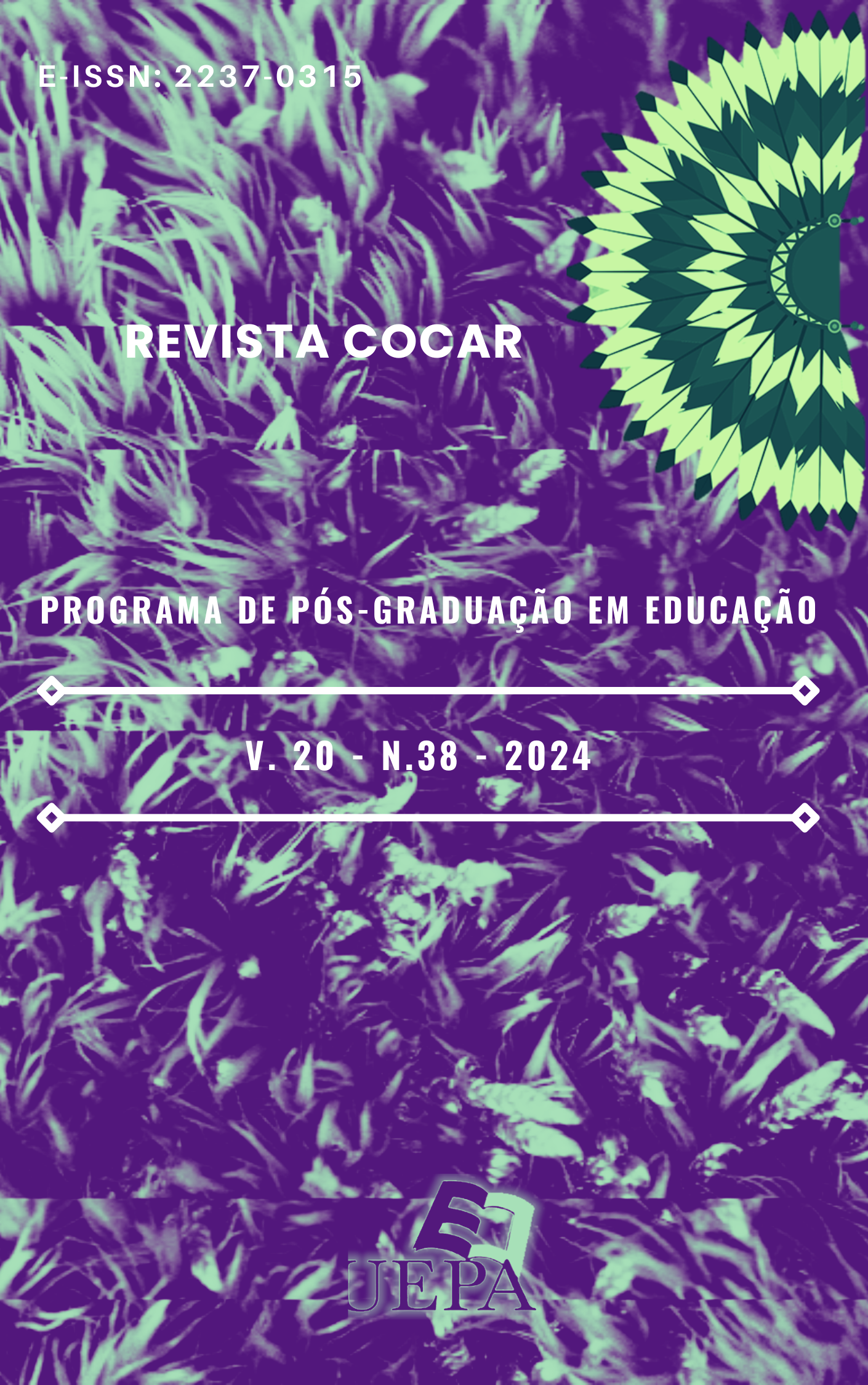Autoeficácia de professores da educação básica, no contexto do ensino remoto
Self-efficacy of basic education teachers in the context of remote teaching
Palavras-chave:
Autoeficácia; Docência; Ensino RemotoResumo
Este estudo investigou o senso de autoeficácia com professores da educação básica, durante o contexto de ensino remoto em decorrência da pandemia do Covid-19. Participaram desta pesquisa 8 pedagogos, 7 do sexo feminino, e 1 do sexo masculino, atuantes em escolas de rede privada e pública da cidade de Belém/PA. A coleta de dados ocorreu de forma remota e presencial. Os participantes responderam ao questionário de caracterização, e roteiro de entrevista. Para análise dos dados, adotou-se a Técnica Análise de Conteúdo. A autoeficácia foi relacionada ao engajamento dos estudantes; a busca de estratégias instrucionais; o controle para manejo de sala de aula e importância do envolvimento da família no ensino. Os resultados contribuíram para investigar as percepções de autoeficácia docente no período do ensino remoto.
Palavras-chave: Autoeficácia; Docência; Ensino Remoto.
Abstract
This study investigated the sense of self-efficacy with basic education teachers, during the remote teaching context due to the Covid-19 pandemic. Eight pedagogues participated in this research, seven female and one male, working in private and public schools in the city of Belém/PA. The data collection occured both remotely and in person. The participants answered the profiling questionnaire, and an interview script. For data analysis, the Content Analysis Technique was adopted. Self-efficacy was related to student engagement; the search for instructional strategies; control for classroom management and the importance of family involvement in education. The results contributed to investigate the teachers’ perception of self-efficacy in the distance education period.
Keywords: Self-eficacy; Teaching; Distance Education.
Downloads
Referências
ARAÚJO, Aneide Oliveira; OLIVEIRA, Marcelle Colares. Tipos de pesquisa. São Paulo,1997.
AZZI, Roberta Gurgel; POLYDORO, Soely. Autoeficácia proposta por Albert Bandura. In: AZZI, Roberta Gurgel; POLYDORO, Soely (Orgs.). Autoeficácia em diferentes contextos. Campinas: Alínea, 2006.
BANDURA, Albert. Social foundations of thought and action: a social cognitive theory. New Jersey: Prentice Hall, 1986.
BANDURA, Albert. Self-efficacy: The exercise of control. New York: W.H. Freeman and Company, 1997.
BANDURA, A. Social Cognitive Theory: An agentic perspective. Annual Review Psychology, v. 52, p.1-26, 2001.
BANDURA. The evolution of social cognitive theory. In: SMITH, K.G. HITT, M.A. Great minds in management. Oxford University Press, 2005. p. 9-35
BANDURA. A. Social foundations of thought and action: A social cognitive theory. Englewood Cliffs, NJ: Prentice Hall, 1986.
BANDURA, A. A evolução da teoria social cognitiva. In: BANDURA, A.; AZZI, R. G.; POLYDORO, S.A.J. (Org.). Teoria social cognitiva: conceitos básicos. Colaboradores: Anna Edith Bellico da Costa, Fabián Olaz, Fabio Iglesias, Frank Pajares. Porto Alegre: Artmed, 2008. p. 15-41
BARDIN, Lawrence. Análise de conteúdo. Lisboa: edições 70, 1995.
BARDIN, Lawrence. Análise de conteúdo. São Paulo: Edições 70, 2011
BRASIL. Lei de Diretrizes e Bases da Educação Nacional: Lei no 9.394/96 de 20 de dez. 1996. Brasília, 1996. Disponível em <http://portal.mec.gov.br/arquivos/pdf/ldb.pdf>. Acesso em: 03 maios 2023.
CASANOVA, Daniele Guerreiro Casanova; Azzi, Roberta Gurgel. Personal and Collective Efficacy Beliefs Scales to Educators: Evidences of Validity. Psico-USF, 2015, , p.399-409, v.20, n. 3.
GARMEZY, N.; MASTEN, A. Chronic adversities. In: RUTTER, M.; TAYLOR, E.; HERSON, L. (Eds.). Child and adolescent psychiatry. Oxford: Blackwell, 1994. p. 191-207
GIBSON, S.; DEMBO, M. H. Teacher Efficacy: A Construct Validation. Journal of Educational Psychology, v. 76, n. 4, p.569-582, 1984.
LEAL, P. C. S. A Educação Diante De Um Novo Paradigma: Ensino A Distância (Ead) Veio Para Ficar! Gestão & Tecnologia, Goiânia, v. 1, n. 30, p. 41-43, jul. 2020.
MARTIN, Andrew J., LINFOOT, Ken., & STEPHENSON, Jennifer. How teachers respond to concerns about misbehavior in their classroom. Psychology in the Schools, 1999, p. 347–358, v. 36.
ORGANIZAÇÃO DAS NAÇÕES UNIDAS PARA A EDUCAÇÃO, CIÊNCIA E CULTURA - UNESCO. A UNESCO reúne organizações internacionais, sociedade civil e parceiros do setor privado em uma ampla coalizão para garantir a #AprendizagemNuncaPara. 2020. Disponível em: <https://pt.unesco.org/news/unesco- reune-organizacoes-internacionais- sociedade-civil-e-parceiros-do-setor-privado- em-uma>. Acesso em: 30 Jul. 2022.
PAROLIN, Isabel Cristina Hierro. Pais e Educadores: quem tem tempo de educar? Porto Alegre: Mediação, 2007.
Professores: 70% enfrentaram dificuldades para lecionar na Pandemia. Correio Braziliense, 2021. Disponível em: <https://www.correiobraziliense.com.br/euestudante/educacao-basica/2021/02/4905615-professores-70--tiveram-dificuldades-para-lecionar-na-pandemia.html.> Acesso em: 27 de fev. 2023.
Profissionais explicam a diferença entre ensino a distância e ensino remoto. Instituto Federal de Alagoas, Alagoas, 10 de fev. 2021. Disponível em: https://www2.ifal.edu.br/noticias/profissionais-explicam-a-diferenca-entre-ensino-remoto-e-ensino-a-distancia. Acesso em: 03 maio. 2023.
Qual o papel dos professores e como estimular a participação dos estudantes?. Educação Integral, 2013. Disponível em: educacaointegral.org.br. Acesso em: 10 mar. 2023.
SCHWARZER, R. & SCHMITZ, G. S. (2004). Perceived Self-efficacy as a resource factor in teachers. Em M. Salanova, R. Grau, I. M. Martínez, E. Cifre, S. Llores, & M. Garcíaren
edo (Eds.). Nuevos Horizontes en la Investigación sobre la Autoeficacia. (pp. 229-236). Castelló de la Plana: Publicacions de la Universitat Jaume I.
VIEIRA, M. F. (2018). A Gestão de EaD no contexto dos Polos de Apoio Presencial: Proximidades e diferenças entre a Universidade Aberta do Brasil e as Instituições universitárias privadas. Tese (Doutoramento em Educação) - Universidade Aberta. Disponível em: < http://hdl.handle.net/10400.2/7182>. Acesso em: 05 ago. 2022.
ZIMMERMAN, B. J.; CLEARY, T. J. Adolescent’s development of personal agency: the role of self-efficacy beliefs and self-regulatory skill. In: PAJARES, F.; URDAN, T. Selfefficay beliefs of adolescents. Greenwich, CT: Information Age Publishing, p. 45-69, 2006.
Downloads
Publicado
- Visualizações do Artigo 85
- pdf downloads: 59























